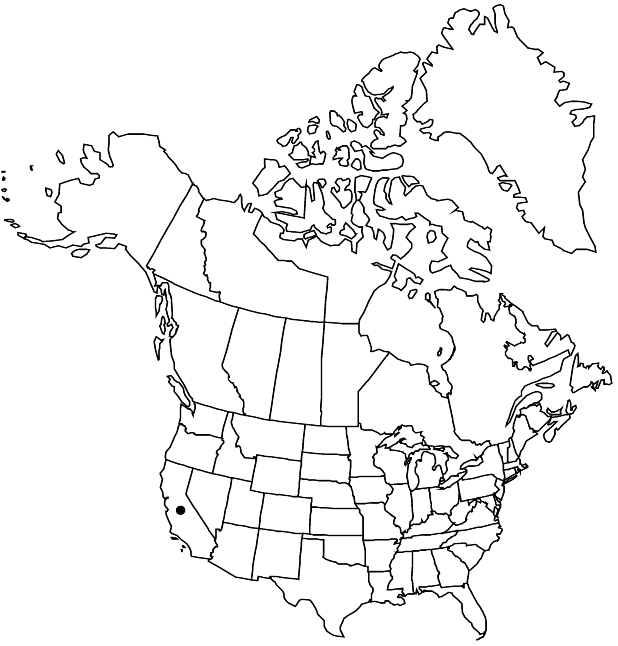Difference between revisions of "Dudleya abramsii subsp. affinis"
Madroño 34: 349, fig. 4. 1987 ,.
FNA>Volume Importer |
imported>Volume Importer |
||
| (3 intermediate revisions by 2 users not shown) | |||
| Line 7: | Line 7: | ||
}} | }} | ||
|common_names=San Bernardino Mountains dudleya | |common_names=San Bernardino Mountains dudleya | ||
| + | |special_status={{Treatment/ID/Special_status | ||
| + | |code=E | ||
| + | |label=Endemic | ||
| + | }}{{Treatment/ID/Special_status | ||
| + | |code=C | ||
| + | |label=Conservation concern | ||
| + | }} | ||
|basionyms= | |basionyms= | ||
|synonyms= | |synonyms= | ||
| Line 24: | Line 31: | ||
|distribution=Calif. | |distribution=Calif. | ||
|discussion=<p>Of conservation concern.</p><!-- | |discussion=<p>Of conservation concern.</p><!-- | ||
| − | --><p>The type population of < | + | --><p>The type population of <i></i>subsp.<i> affinis</i> is notable for its solitary, small rosettes of leaves wide for their length, but K. M. Nakai (1987) mentioned plants in Cushenbury Canyon with up to 50 rosettes.</p><!-- |
--><p>Subspecies affinis is local in the northern part of the San Bernardino Mountains and considered fairly endangered (California Native Plant Society, http://cnps.web.aplus.net/cgi-bin/inv/inventory.cgi).</p> | --><p>Subspecies affinis is local in the northern part of the San Bernardino Mountains and considered fairly endangered (California Native Plant Society, http://cnps.web.aplus.net/cgi-bin/inv/inventory.cgi).</p> | ||
|tables= | |tables= | ||
| Line 34: | Line 41: | ||
-->{{#Taxon: | -->{{#Taxon: | ||
name=Dudleya abramsii subsp. affinis | name=Dudleya abramsii subsp. affinis | ||
| − | |||
|authority=K. M. Nakai | |authority=K. M. Nakai | ||
|rank=subspecies | |rank=subspecies | ||
| Line 48: | Line 54: | ||
|publication title=Madroño | |publication title=Madroño | ||
|publication year= | |publication year= | ||
| − | |special status= | + | |special status=Endemic;Conservation concern |
| − | |source xml=https:// | + | |source xml=https://bitbucket.org/aafc-mbb/fna-data-curation/src/2e0870ddd59836b60bcf96646a41e87ea5a5943a/coarse_grained_fna_xml/V8/V8_370.xml |
|genus=Dudleya | |genus=Dudleya | ||
|subgenus=Dudleya subg. Dudleya | |subgenus=Dudleya subg. Dudleya | ||
Latest revision as of 22:43, 5 November 2020
Caudices mostly simple, 1–1.5 cm diam. Leaves: rosettes solitary; blade oblanceolate to elliptic, ± laminar, 1.5–4 × 0.7–1.5 cm. Inflorescences: floral shoots 5–11 × 0.2–0.3 cm; proximalmost leaf blades 5–10 mm; branches 2–3, simple. Pedicels 2–8 mm. Flowers: calyx 3–4 × 3–4 mm; petals connate 1.5–3 mm, pale yellow, red-lineolate, 9–11 × 1.5–2 mm, tips spreading. 2n = 34.
Phenology: Flowering early summer.
Habitat: Granite, quartzite, rarely limestone
Elevation: 1800-2600 m
Discussion
Of conservation concern.
The type population of subsp. affinis is notable for its solitary, small rosettes of leaves wide for their length, but K. M. Nakai (1987) mentioned plants in Cushenbury Canyon with up to 50 rosettes.
Subspecies affinis is local in the northern part of the San Bernardino Mountains and considered fairly endangered (California Native Plant Society, http://cnps.web.aplus.net/cgi-bin/inv/inventory.cgi).
Selected References
None.
